We believe in change driven by technology and innovation.Meet the brains behind our smooth running and powerful machine.Join our team of experts to make a difference in the real world.Learn about Appinventiv's product lifecycle development process.Our software development services are built to evolve your business idea into a successful growth storythat deploy customized solutions in …
21 Best Mental Health App Features for 2025 and Beyond – appinventiv.com

We believe in change driven by technology and innovation.
Meet the brains behind our smooth running and powerful machine.
Join our team of experts to make a difference in the real world.
Learn about Appinventiv’s product lifecycle development process.
Our software development services are built to evolve your business idea into a successful growth story
that deploy customized solutions in a wide range of industries
to steadfast success for top globally leading brands
A leading digital platform to offer engaging shopping experience to users
A transforming ERP Solution for the world’s largest furniture retailer
A mobile app to digitalize
& expand KFC’s digital
footprint
A refined UX strategy for Domino’s to increase their conversion rate by 23%
The MIT Innovation award-winning app with $52 Million funding reshaping the employment landscape
A SaaS-based financial literacy and smart money management platform for kids
We believe in change driven by technology and innovation.
Join our team of experts to make a difference in the real world.
Learn about Appinventiv’s product lifecycle development process.
Meet the brains behind our smooth running and powerful machine.
that deploy customized solutions in a wide range of industries
Our software development services are built to evolve your business idea into a successful growth story
A leading digital platform to offer engaging shopping experience to users
A transforming ERP Solution for the world’s largest furniture retailer
A mobile app to digitalize & expand KFC’s digital footprint
A refined UX strategy for Domino’s to increase their conversion rate by 23%
The MIT Innovation award-winning app with $52 Million funding reshaping the employment landscape
A SaaS-based financial literacy and smart money management platform for kids
to steadfast success for top globally leading brands
With mental health issues like stress, anxiety, depression, and burnout at all-time highs, the conventional healthcare system struggles to meet the soaring demand for holistic care. However, the unprecedented wave of technological advancement has flipped the curveball of the approach of care in the realm of mental health. And with the growing trends and innovation, the role of technology in mental health has become indispensable allies.
The National Institutes of Health (NIH) reports that 57.8 million adults live with some form of mental illness. These numbers speak volumes: the demand for accessible, effective, and innovative mental health solutions has never been greater.
Mental Health Apps are no longer just a digital trend—they’re becoming the cornerstone of how we cope, grow, and thrive.
But with innovation driving this space, the question arises: What features truly define a transformative mental health app in 2025 and beyond?
This detailed blog explores the 21 most forward-thinking mental health app features shaping the industry’s future.
The demand for mental health care is reaching a critical point in the years to come, driven by a worsening global mental health crisis. Over 1 billion people worldwide experience some form of mental health issue, yet more than 75% do not receive the necessary treatment (WHO).
According to the National Institutes of Health (NIH), The following are the rates of past year prevalence of mental illnesses in U.S. adults according to the NIH: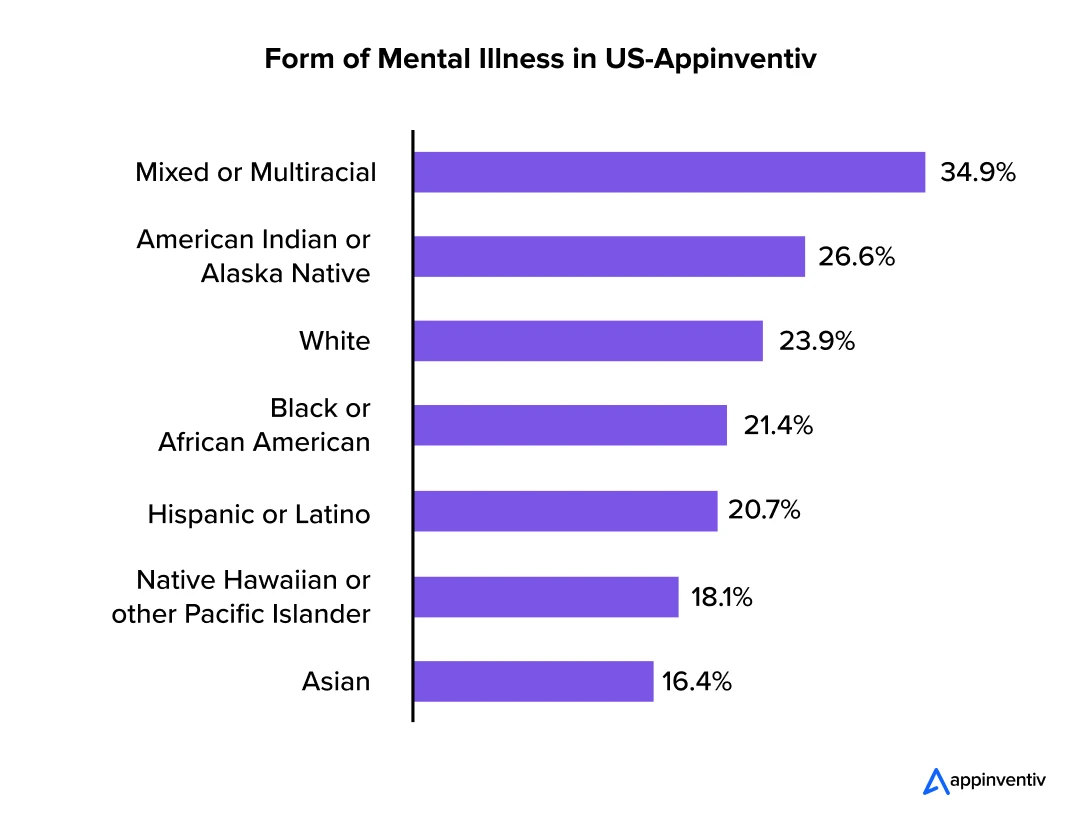
As these issues persist, there is a growing urgency to find effective and accessible solutions. Mental health apps are emerging as powerful tools in this regard, providing users with convenient, on-demand support.
These digital tools, particularly mental health apps, are helping to eliminate traditional barriers such as the high cost of therapy, stigma, and the limited availability of mental health professionals.
With features like AI-powered mental health therapy, real-time mood tracking, and personalized care, these apps offer scalable solutions that can be deployed globally. In the section below, we will learn more about those critical mental health app features.
Adding multiple features to a healthcare app is easy, but choosing the best features that make your app worth using is like finding a needle in a haystack. To do this, you need to understand your patients’ or app users’ healthcare preferences first, then analyze the type of mental health app they require.
Today’s patients expect more than just treatment—they value transparency, personalization, and tech-driven solutions. Focusing on these preferences can enhance patient satisfaction and foster long-term loyalty.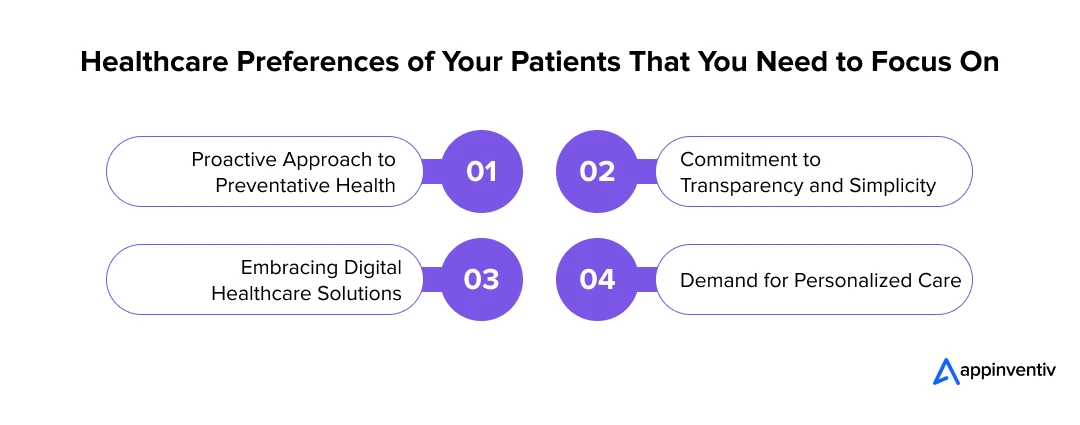
Millennials and Gen Z patients emphasize wellness through fitness, nutrition, and routine health check-ups. They are attracted to healthcare providers focusing on preventive care rather than just addressing illnesses.
Transparency in healthcare is vital for patient-centricity. Patients appreciate providers who offer upfront details about costs, treatment options, and outcomes, making the process clear and accessible.
Technology-driven healthcare resonates with patients who prefer telehealth, mobile apps, and wearables. These digital tools allow them to manage appointments, consult professionals, and track their health effortlessly.
These days, patients of all ages seek individualized healthcare solutions that cater to their genetic, lifestyle, and mental health needs. Tailored treatment plans and wellness strategies are key to gaining their trust and engagement.
Mental health apps are revolutionizing wellness by offering solutions for therapy, stress management, meditation, and more. Let’s examine some of the key types.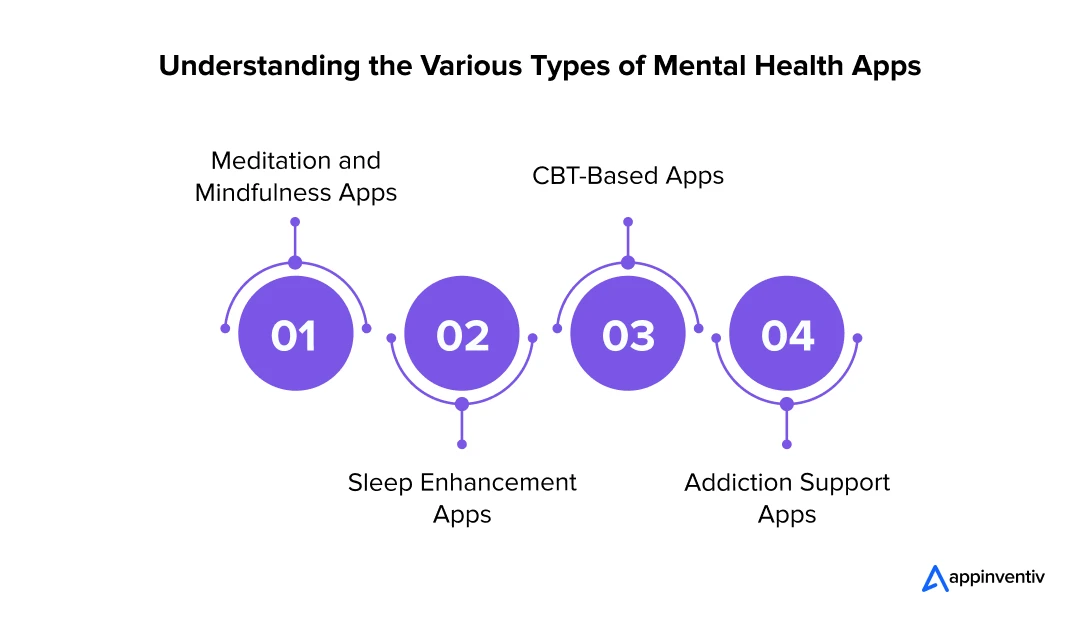
These apps focus on relaxation and mental clarity. They provide guided meditations, mindfulness exercises, and breathing techniques to help reduce stress and enhance focus.
These apps help improve sleep quality by analyzing sleep patterns, offering guided bedtime routines, and providing features like white noise, calming sounds, and relaxation techniques.
Focused on Cognitive Behavioral Therapy techniques, these apps guide users through structured exercises to challenge negative thoughts and develop healthier coping strategies.
Designed for individuals recovering from addictions, these apps offer tools to track progress, connect with support groups, and access recovery-focused resources.
Explore other mental health app types and their potential to transform care in our comprehensive guide.
An effective on-demand mental health app is designed with three key panels—User Panel, Therapist Panel, and Admin Panel—each tailored with distinctive features. These panels ensure seamless interaction, personalized care, and efficient management, creating a holistic mental health support platform.
User Panel Features
Therapist Panel Features
Admin/Management Panel
Let’s have a detailed look at the panel-wise features of the mental health app:
The User Panel is designed to provide a seamless and personalized experience, allowing users to access mental health resources, track their progress, and engage with AI-powered therapy tools. Here are some of the top mental health app features (user panel):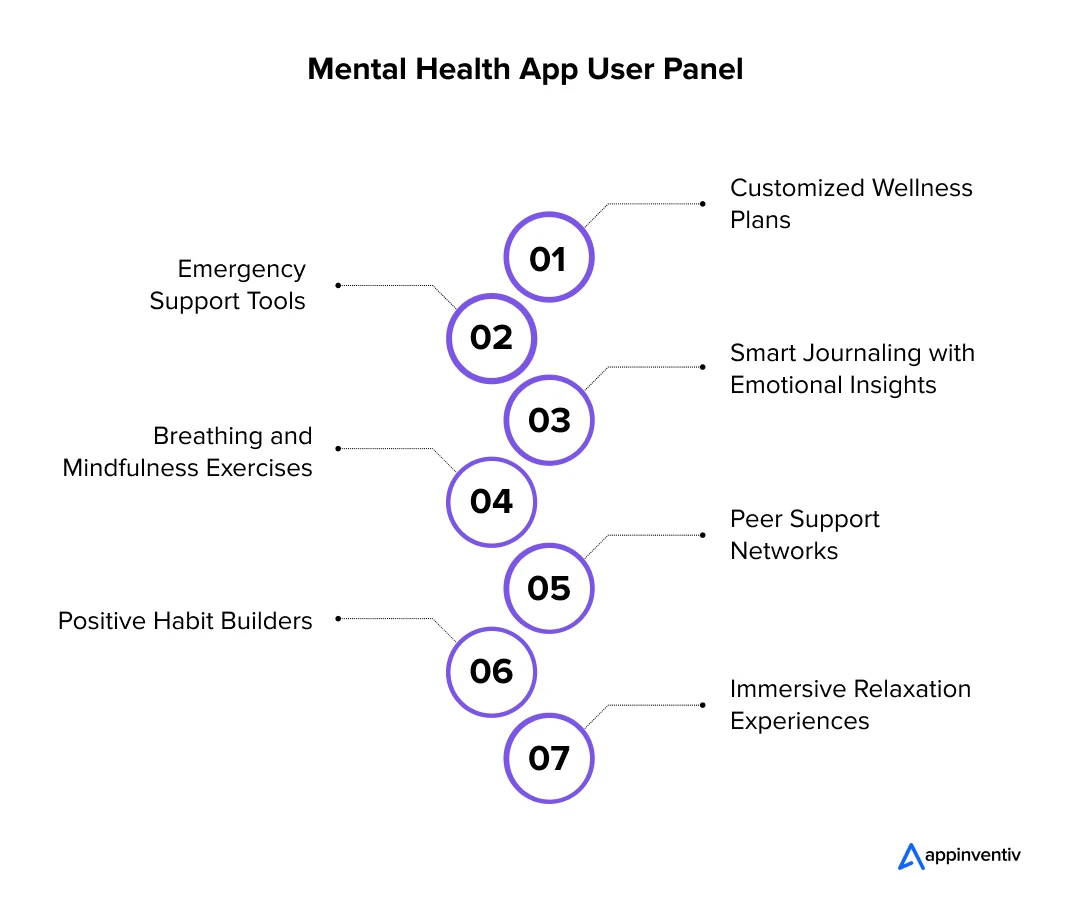
One of the best mental health app features is the customization functionality, which helps users craft personalized mental health plans by combining self-care tasks, daily activity suggestions, and tailored reminders. The app promotes consistent progress toward wellness goals by focusing on unique user needs.
The crisis management feature offers immediate access to helplines or professionals through a dedicated button, ensuring timely intervention during critical moments when users feel overwhelmed or at risk.
For instance, Appinventiv designed YouCOMM, a dedicated app revolutionizing the traditional call bell system. This emergency support app enables seamless communication with nurses, ensuring swift assistance during critical situations.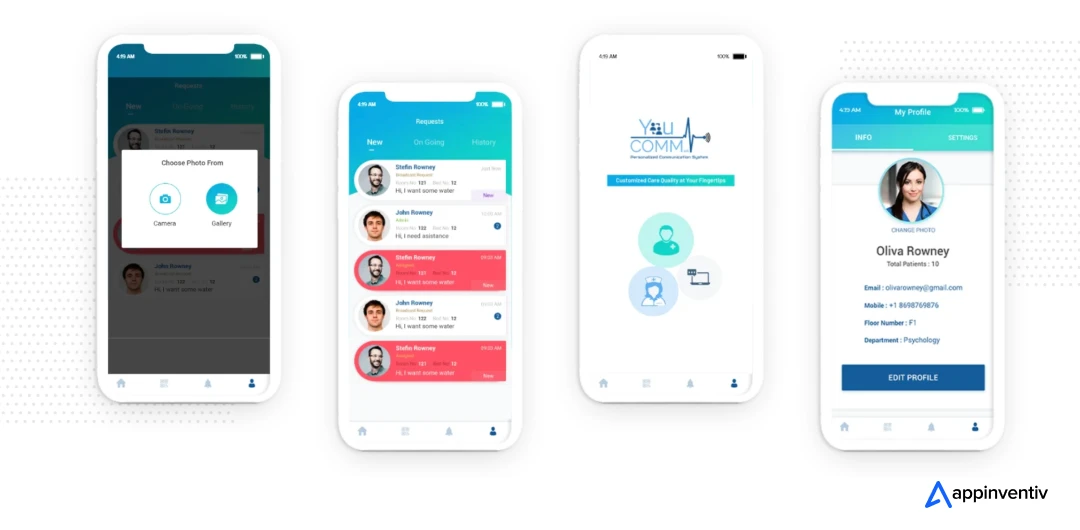
As a result, YouCOMM has received extensive positive media recognition. In 2019, the app was awarded the CT Bioscience Innovation Fund and an Entrepreneurs Innovations Award. Read our success story here.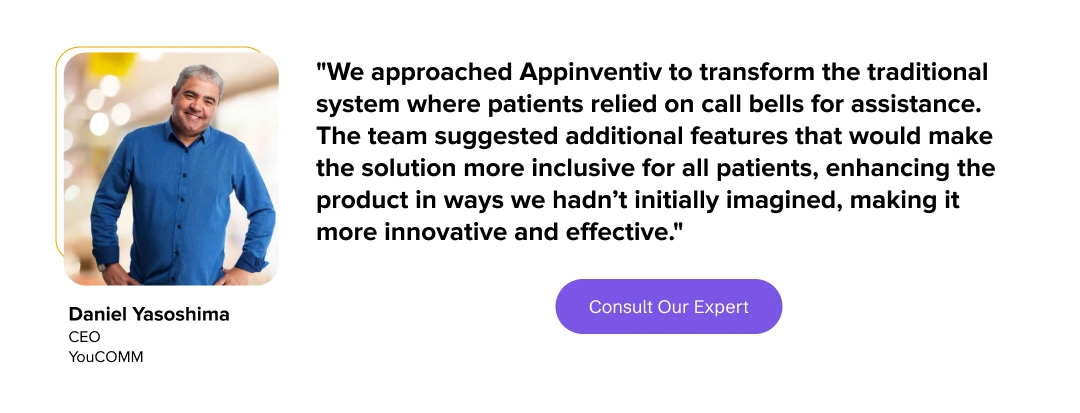
The journaling feature allows users to log their thoughts and emotions, with AI-powered analysis providing insights into mood trends. It is a reflective tool that encourages users to identify emotional patterns and triggers.
This feature provides guided breathing sessions and mindfulness exercises to lower stress levels.
The integration of calming visuals and soothing audio enhances the overall relaxation experience.
The peer support networks feature creates safe, moderated spaces for users to connect with others with similar mental health challenges. It fosters community building and reduces feelings of isolation.
This feature supports users in developing healthy routines, such as practicing gratitude or maintaining consistent sleep patterns. It includes reminders and progress trackers to encourage adherence.
The immersive relaxation feature uses VR to simulate peaceful environments like beaches or forests. These virtual escapes offer users a chance to relax and recharge mentally in a unique, engaging way.
The Therapist Panel offers mental health professionals the tools they need to effectively manage and support their clients. Here are some of the top features of a mental health app from a therapist panel perspective.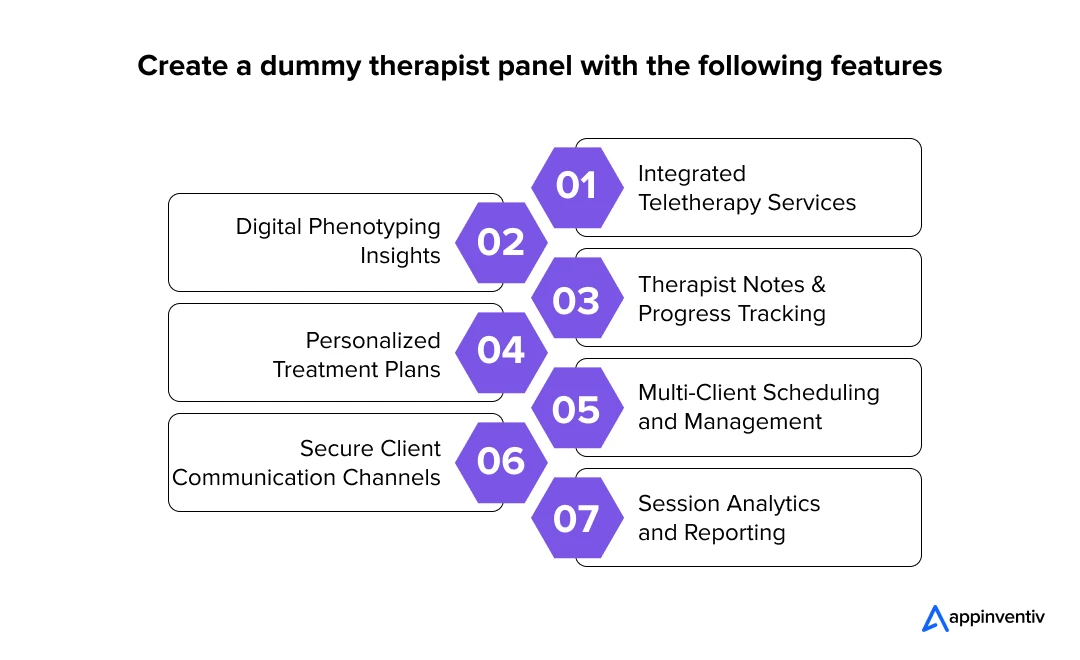
This feature provides therapists a seamless platform for conducting mental health consultations via video or voice sessions, ensuring secure and uninterrupted communication. The app integrates scheduling, session reminders, and secure file sharing to improve the virtual therapy experience.
This feature analyzes behavioral and usage data to identify subtle changes in client patterns that may indicate shifts in mental health. Data visualizations, such as sleep habits, mood fluctuations, or interaction frequencies, help professionals detect early warning signs and intervene effectively.
Therapists can seamlessly conduct mental health consultations, securely record session notes, set personalized goals, and track client progress over time. The feature organizes historical data with built-in analytics, helping professionals make informed decisions about treatment adjustments.
This feature uses AI and client data to suggest tailored therapy approaches. It supports therapists in designing dynamic treatment plans that adapt as clients achieve milestones or share new concerns. This ensures that therapy remains relevant, personalized, and aligned with clients’ evolving needs.
Therapists can efficiently organize multiple appointments with tools that support calendar integration, rescheduling, and automatic reminders. This feature reduces administrative burden, helping professionals focus more on client care and less on logistics.
Encrypted messaging platforms allow therapists to maintain secure communication with clients between sessions. These channels offer confidentiality while enabling timely responses to questions, concerns, or progress updates, building trust and continuity in the therapeutic relationship.
Again, one of the most crucial mental health app features is session analytics and reporting, which evaluate key metrics, such as session attendance, duration, and engagement levels, to help therapists assess the effectiveness of their interventions. Comprehensive reports provide actionable insights, allowing therapists to refine their techniques and enhance client outcomes.
The Admin/ Management Panel provides administrators with the tools to oversee the app’s operations, manage user accounts, and monitor overall performance. Here are the top mental health app features to look for in the admin panel.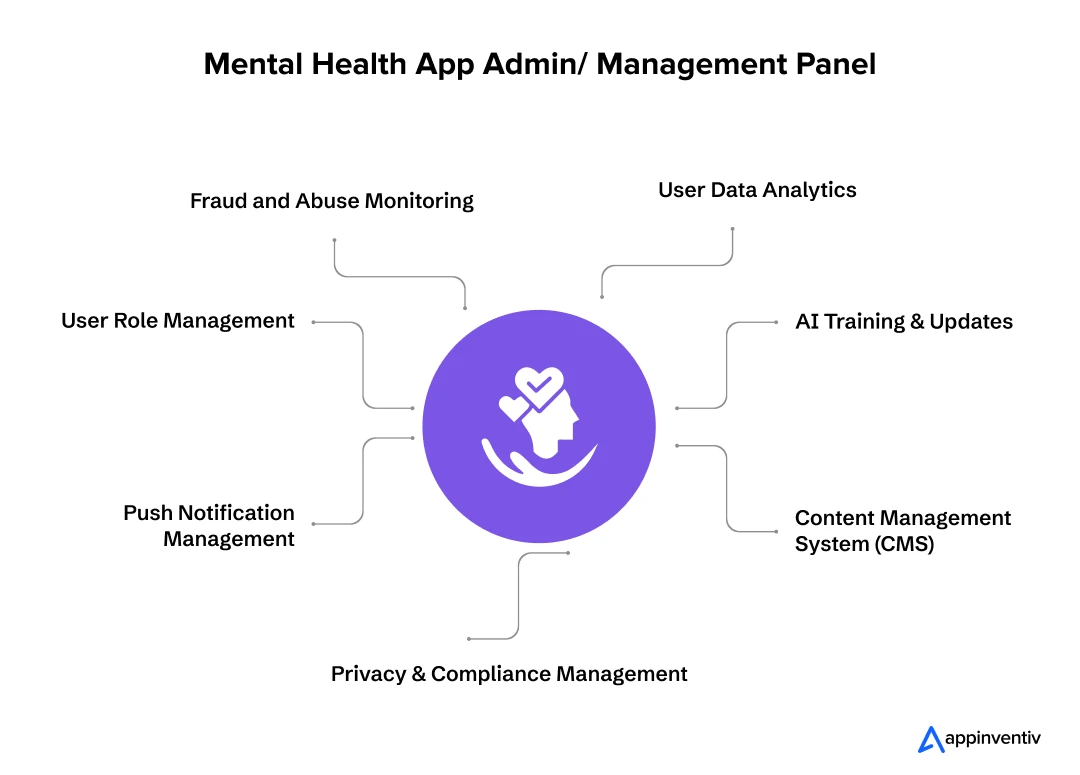
This feature provides real-time insights into user activity, app engagement trends, and feature performance. It helps administrators identify popular tools, analyze drop-off points, and uncover areas for improvement. These insights enable data-driven decisions to enhance app usability.
Administrators can monitor and manage AI updates, ensuring algorithms evolve to deliver accurate and effective mental health support. This feature keeps the app up-to-date with advancements in machine learning and behavioral insights, maintaining relevance and reliability in user interactions.
A robust CMS allows administrators to update educational materials, therapy exercises, and other app content effortlessly. This ensures the app remains current with the latest research and methods, offering users reliable and well-curated resources tailored to their mental health needs.
This feature, designed to ensure strict adherence to regulations like GDPR and HIPAA, includes tools for encryption, automated compliance checks, and user consent management. It offers peace of mind for administrators and users, safeguarding sensitive information from data breaches.
Administrators can design, schedule, and send targeted notifications, such as therapy reminders, motivational messages, or feature updates. This ensures users stay engaged without being overwhelmed by irrelevant or excessive alerts, maintaining a balanced communication strategy.
Admins can assign and control roles, defining permissions for users, therapists, and moderators. This feature ensures secure and organized access to different app functionalities, reducing the risk of data misuse and streamlining operations for all participants.
Sophisticated algorithms monitor user activities to detect and prevent fraudulent behavior or misuse. Alerts notify administrators of suspicious activities, helping to maintain a safe and ethical environment where users can focus on their mental health journey.
Advanced mental health app features can significantly enhance the interactivity and engagement of mental health apps. Appinventiv’s experts specialize in integrating innovative functionalities to ensure your app stands out in today’s competitive landscape. Take a look at these transformative mental health app features.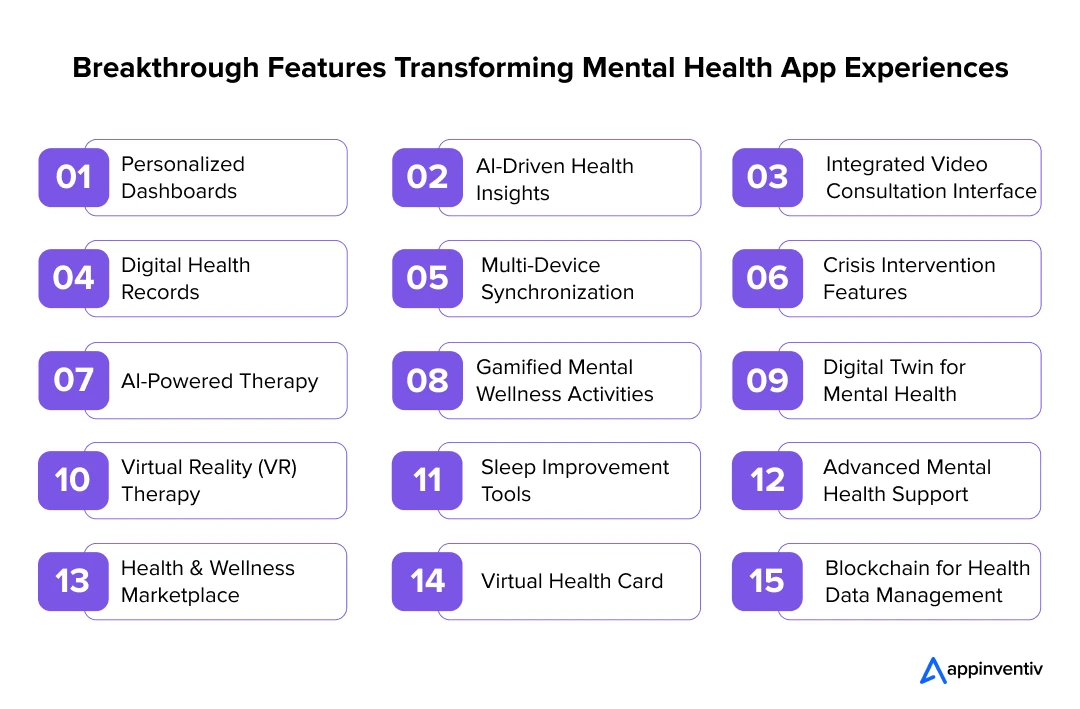
Customizable dashboards display relevant health data, allowing users to track progress and access critical information based on their unique needs and preferences.
For instance, at Appinventiv, we created a platform called Health-e-People that allows users to store and monitor healthcare data from multiple apps and devices, find caregivers for their loved ones, and connect with a wider healthcare community. We integrated the Human API platform to achieve this, enabling seamless consolidation of third-party device data into the app.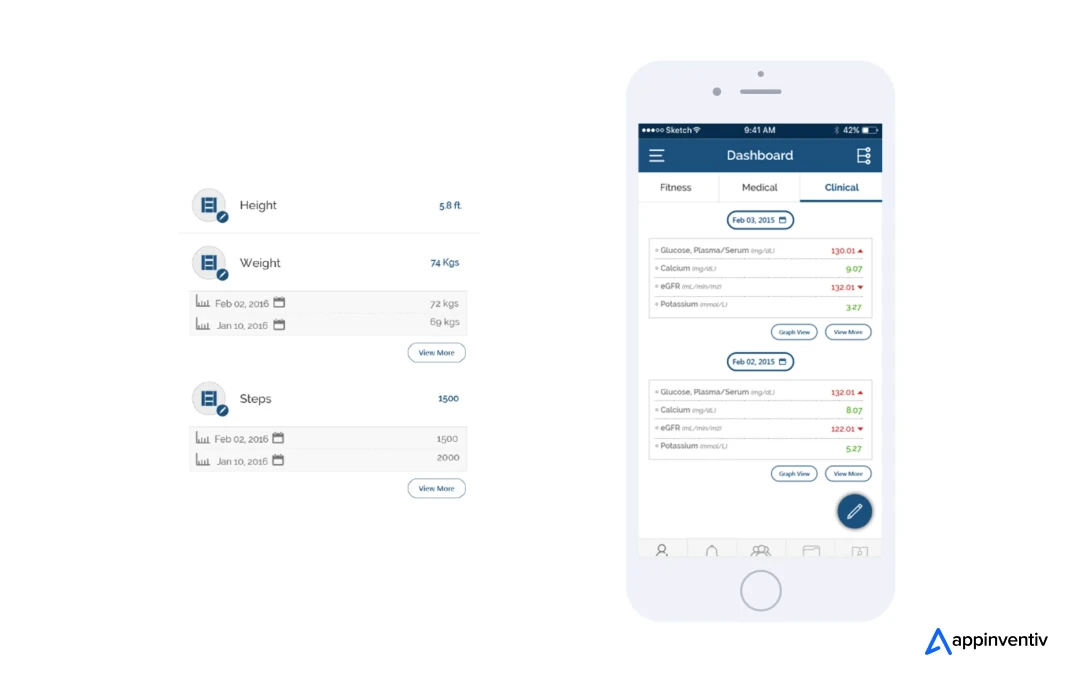
Our development began by transforming the product idea into a structured process. We used Agile cycles to break down features for users, caregivers, and researchers. This approach ensured a streamlined, user-centric experience across all panels.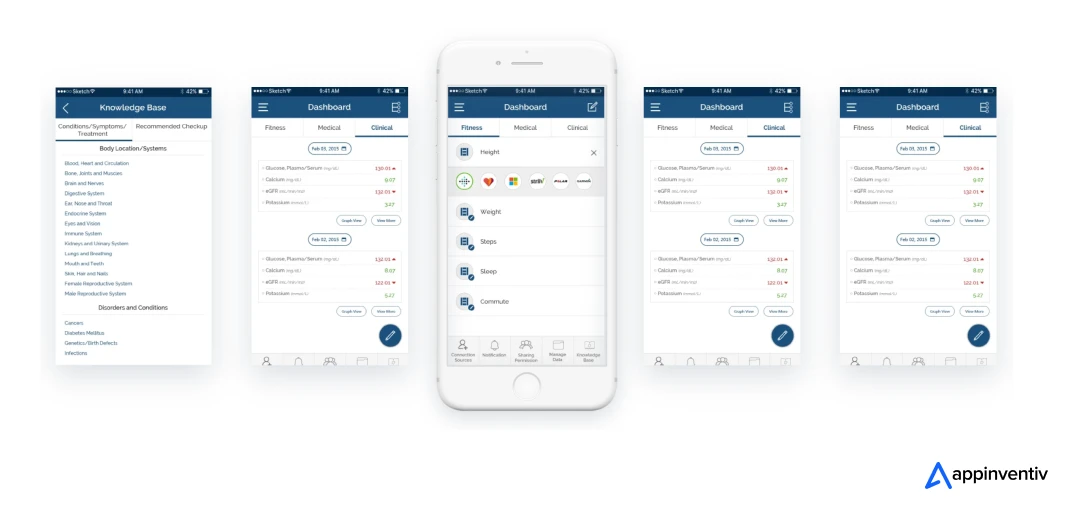
The results were outstanding. Appinventiv simplified every complex process into manageable steps, making the application user-friendly and intuitive. The final product delivers all intended functionalities, providing valuable benefits to users, caregivers, and researchers.
AI analyzes user data to generate meaningful insights, offering personalized recommendations and predicting health trends to support proactive care management.
High-quality video consultations with additional features such as chat, screen sharing, and appointment scheduling, ensuring a comprehensive virtual healthcare experience.
A secure, centralized system that allows users to access and manage their health history, prescriptions, and lab results anytime, ensuring seamless continuity of care.
Ensures data synchronization across multiple devices, enabling users to access their health information and continue their care seamlessly from desktops, smartphones, or tablets.
One of the main benefits of mental health apps for users is that they are specifically designed for emergencies. With crisis intervention features like a panic button, users can instantly connect to hotlines or emergency services. With optional location sharing, responders can quickly assist during urgent situations.
AI-enabled chatbots revolutionize mental health support by delivering interventions like Cognitive Behavioral Therapy (CBT). These virtual therapists analyze user inputs to offer personalized and meaningful guidance, ensuring users can access reliable mental health resources anytime.
Interactive challenges like mindfulness games boost engagement in mental health practices. Our mental health app developers implement gamification elements, such as progress tracking and rewards, to enhance motivation. Users develop healthy routines through fun and rewarding activities.
Digital twin technology creates a virtual representation of a user’s mental health, allowing apps to simulate and predict the impact of treatments or lifestyle changes. This advanced feature empowers users to make informed decisions about their mental health care.
VR technology introduces immersive environments for mental health care, offering effective exposure therapy app features in controlled settings. It helps users confront fears, alleviate stress, and practice mindfulness through interactive experiences tailored to diverse mental health conditions.
Comprehensive sleep tools within mental health apps analyze sleep patterns and provide customized strategies for better rest. Features like guided meditations, white noise options, and personalized bedtime routines help users enhance sleep quality, significantly influencing mental health.
Advanced mental health features include AI-driven insights, automated progress tracking, and tailored support mechanisms. These tools enhance treatment outcomes by precisely addressing unique mental health needs.
An integrated marketplace provides access to wellness products and services, including fitness programs, mindfulness courses, and mental health resources, fostering a holistic approach to well-being.
Another top feature of a mental health app is the availability of virtual health cards. A virtual health card centralizes health data, including medical records and insurance details, simplifying access for users and providers while ensuring secure, streamlined healthcare management.
Blockchain technology ensures the secure storage and management of sensitive health data, enabling transparent and tamper-proof sharing between users, providers, and organizations. This feature boosts trust and compliance in mental health care.
The mental healthcare industry is transforming significantly, driven by innovative apps that enhance diagnosis accuracy and patient care. Some leading use cases showcase real-world examples of top mental health apps that substantially improve accessibility, personalization, and overall mental well-being.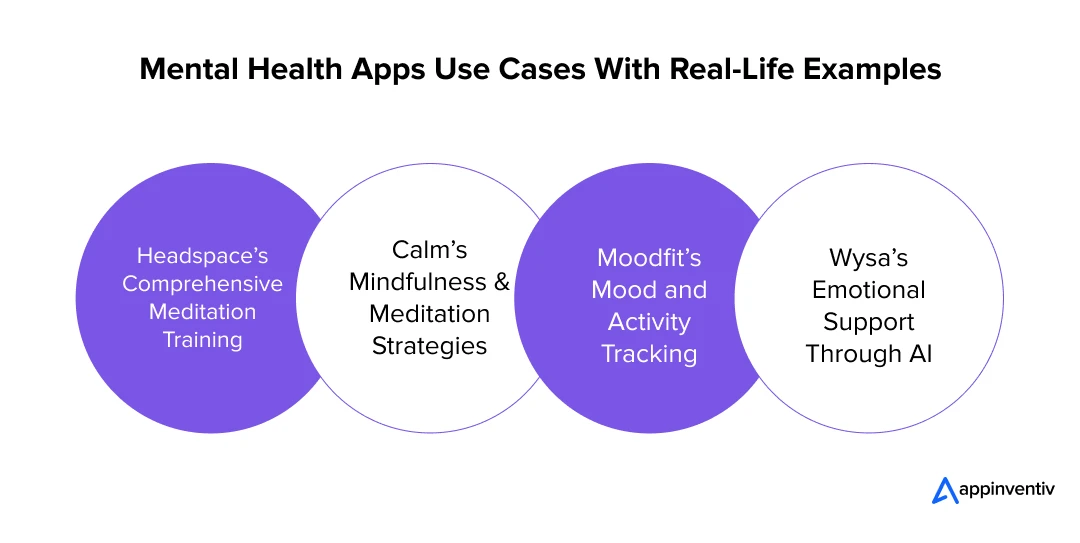
Few mental health tracker apps focus on offering a structured meditation journey, catering to different levels of expertise. They guide users through tailored sessions to address specific mental health challenges, such as grief, focus issues, or stress, often blending educational content with practical exercises.
Headspace is known for its themed meditation packs that address various mental health concerns, such as stress reduction and sleep improvement.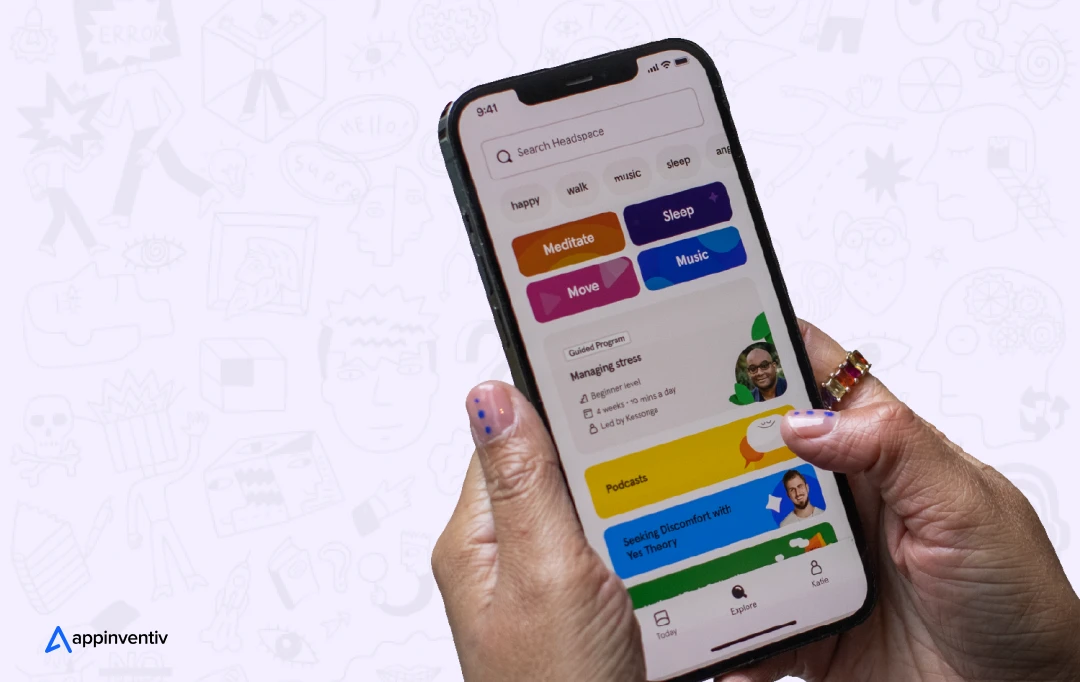
Its animated video tutorials make complex meditation techniques simple and engaging, ensuring accessibility for users of all ages and backgrounds.
Mental health tracker apps focusing on mindfulness and meditation aim to reduce stress and anxiety and improve sleep quality by guiding users through relaxation techniques. They employ structured sessions, soothing audio, and user-centric exercises to create a calming experience. These apps often cater to beginners and seasoned meditators, making mindfulness accessible to a broad audience.
Calm stands out for its holistic approach to mindfulness. The mental health app offers features like guided meditations, breathing exercises, and sleep stories narrated by celebrities like Matthew McConaughey.
The app’s emphasis on sleep enhancement and stress reduction has earned it widespread acclaim, making it one of the top mindfulness tools globally.
Also Read: How to Develop a Calm-like Meditation App?
Mood and activity trackers help users log their emotions, behaviors, and triggers daily. These apps provide insights into patterns over time, enabling users to identify stressors and track progress. They often integrate with wearable devices, combining physical activity data with mental health metrics for a comprehensive approach.
Moodfit is an all-in-one mental fitness app with features like mood tracking, gratitude journaling, and therapy session reminders.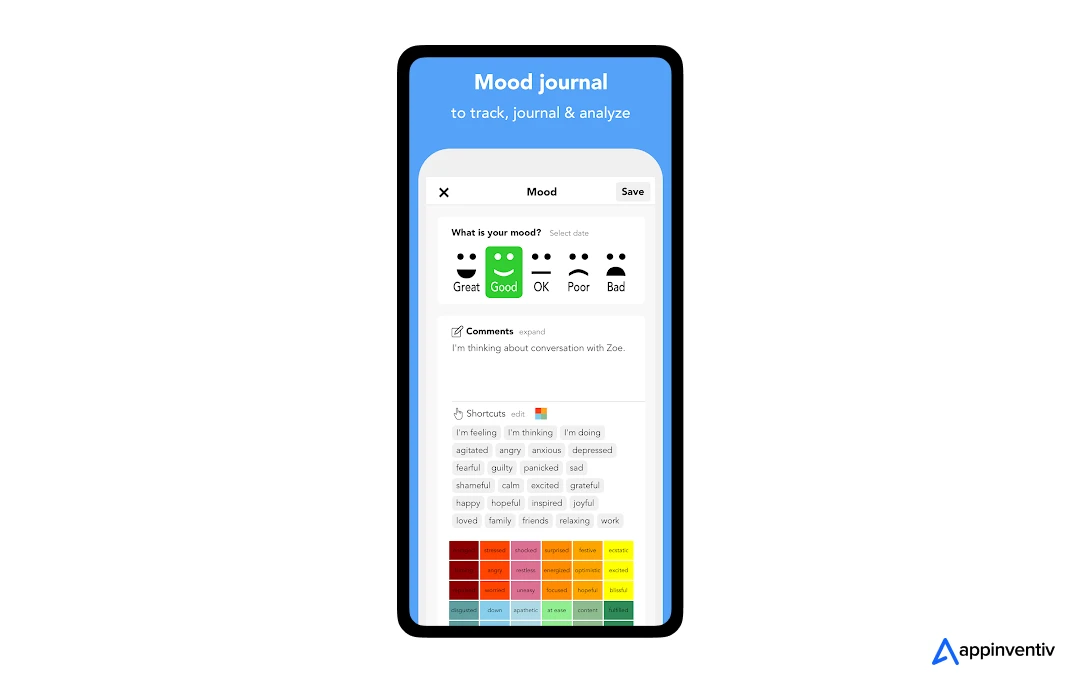
The app’s integration with wearable devices like Fitbit allows users to monitor their physical and emotional health simultaneously, offering personalized recommendations based on collected data.
AI-driven mental health apps leverage conversational bots to provide scalable and accessible emotional support. These bots simulate empathetic human interactions and offer evidence-based therapeutic techniques like Cognitive Behavioral Therapy (CBT). By combining AI with human assistance, these apps ensure users receive timely and personalized care.
Wysa is a pioneer in AI-powered emotional support, offering a chatbot that helps users navigate stress, anxiety, and depression.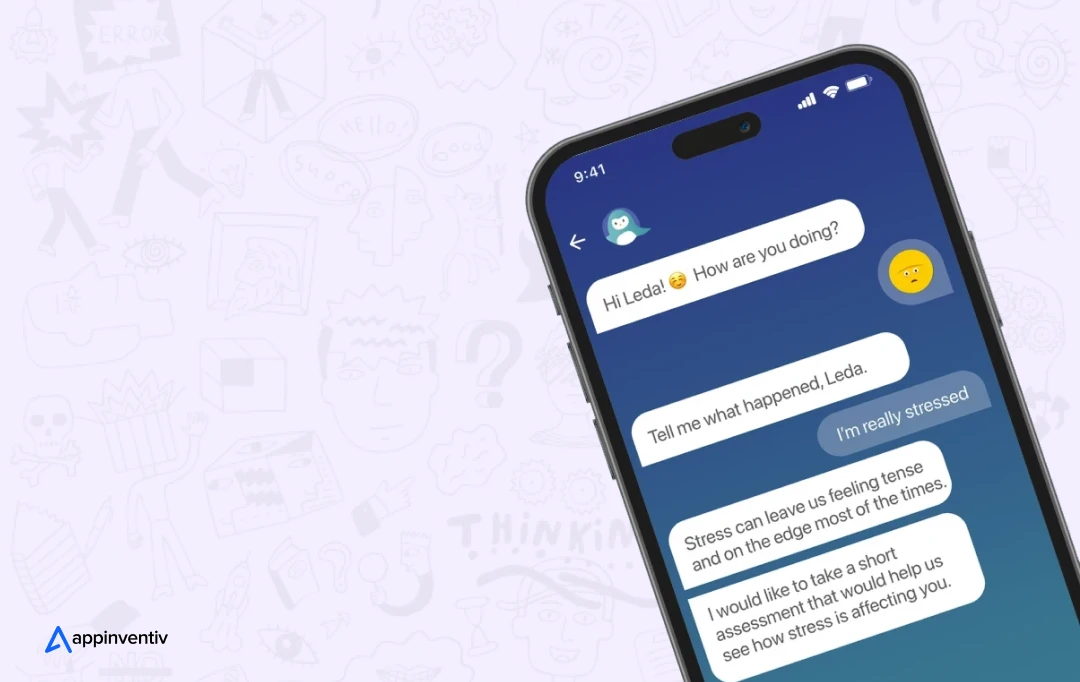
It employs advanced mental health app features like CBT techniques and mood journaling to guide users toward better mental health. The app also allows seamless transitions to licensed therapists for users needing professional help.
Also Read: 36 Use Cases and Examples of AI Emotion Recognition
When creating a mental health app, it’s crucial to prioritize user privacy, data security, and accessibility to provide a safe and effective platform. Careful consideration of these aspects ensures the app supports users’ mental well-being.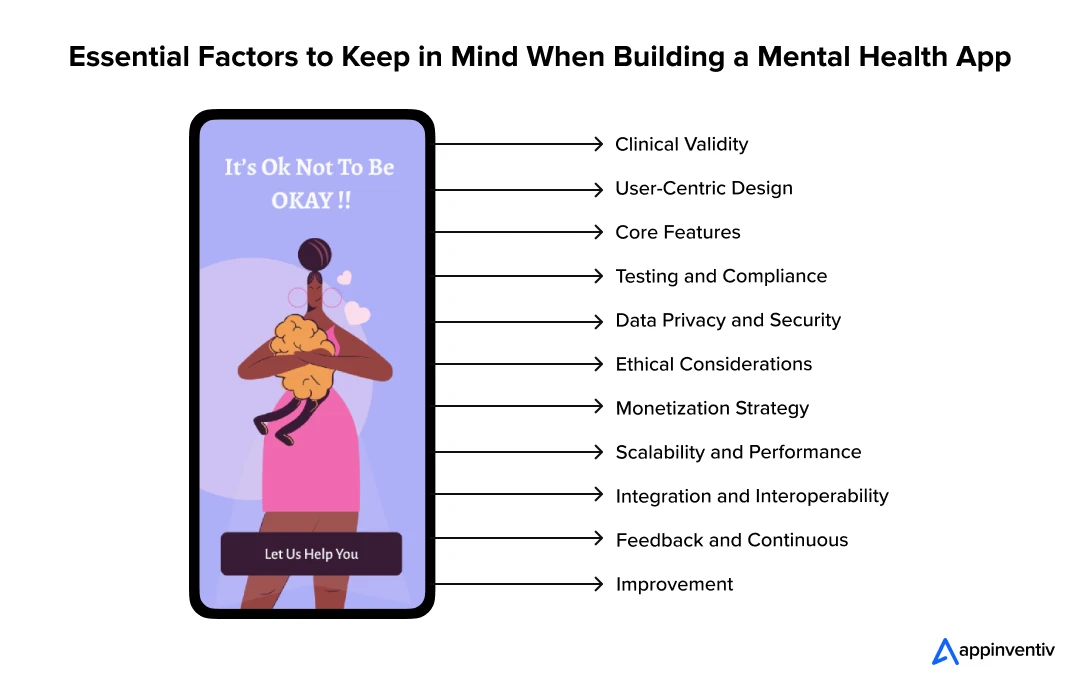
Collaborate with licensed mental health professionals to integrate evidence-based interventions and techniques. Use validated tools like PHQ-9 or GAD-7 for accurate mental health assessments. Continuously update the app with the latest research and clinical best practices to ensure it remains effective and credible for its users.
Design the app with simplicity and accessibility, ensuring it caters to users of varying technical abilities. Personalization is key—allowing users to set goals, adjust themes, or choose notification preferences to make the app feel tailored to them. Additionally, include mental health app features for inclusivity, such as multi-language support and accommodations for users with disabilities, like screen readers or larger font sizes.
To help users monitor and improve their mental well-being, include foundational functionalities like mood tracking, journaling, and guided meditations. Advanced mental health app features such as AI-powered chatbots can provide real-time support, while teletherapy options enable access to licensed therapists. Community forums or peer networks can foster social connections and provide additional emotional support.
Conduct thorough usability testing to ensure the app is intuitive and user-friendly. Rigorously test for security vulnerabilities to protect sensitive user data. Seek certifications or endorsements from mental health organizations to validate the app’s credibility and compliance with industry standards.
Protecting user data is critical to maintaining trust and ensuring compliance with privacy regulations. Employ encryption for secure data storage and transfer and provide anonymity options for users who wish to remain unidentifiable. To prevent unauthorized access, integrate secure authentication methods like two-factor authentication, ensuring user data remains protected.
Ensure that the app avoids potentially harmful or triggering content. Add disclaimers to clarify that the app complements but does not replace professional mental health care. Provide mechanisms for crisis intervention, such as direct links to emergency hotlines, ensuring that users in distress have access to immediate help.
Choose a revenue model that aligns with user expectations and needs. A freemium model with premium in-app purchases can attract a broad audience while offering advanced features for paying users. Alternatively, subscription-based services or partnerships with healthcare providers and insurers can provide sustainable income streams.
Also Read: How Much Money Can You Earn Through An App?
Build the app with scalability to accommodate a growing user base without performance issues. Optimize it for different devices and platforms, including iOS and Android. Prioritize fast load times and a crash-free experience to maintain a seamless user experience as the app grows.
Integrate the app with wearable devices to monitor health metrics like sleep patterns, heart rate, and activity levels. Enable interoperability with electronic health records (EHRs) and other health apps to provide a comprehensive overview of the user’s mental and physical health. This can also facilitate collaboration between users and their healthcare providers.
Collect user feedback regularly through in-app surveys and ratings to understand their needs and expectations. Use analytics to monitor feature performance and identify areas for improvement. Incorporate user insights into regular updates, ensuring the app evolves to meet changing user demands and remains engaging.
After looking into the extensive mental health app development process, let’s move on and analyze how partnering with a reliable healthcare app development firm can streamline your project, enhance innovation, and ensure your app meets industry standards for quality and compliance.
The future of mental health apps is bright, with technology transforming how we approach mental well-being. To stay ahead of this transformation, it’s essential to build an app that not only meets the growing demand for accessible mental health care but also provides personalized, scalable, and secure solutions.
Being a trusted mental health app development company, Appinventiv has a decade of experience creating transformative mental health solutions designed to revolutionize care. Our approach is rooted in a deep understanding of the evolving landscape of mental health, where technology can bridge gaps in access, quality, and personalization.
For example, we developed Soniphi, a personal wellness app that provides instant health analysis reports. The app offers health insights through voice analysis by combining bioacoustic research with a user-friendly mobile platform.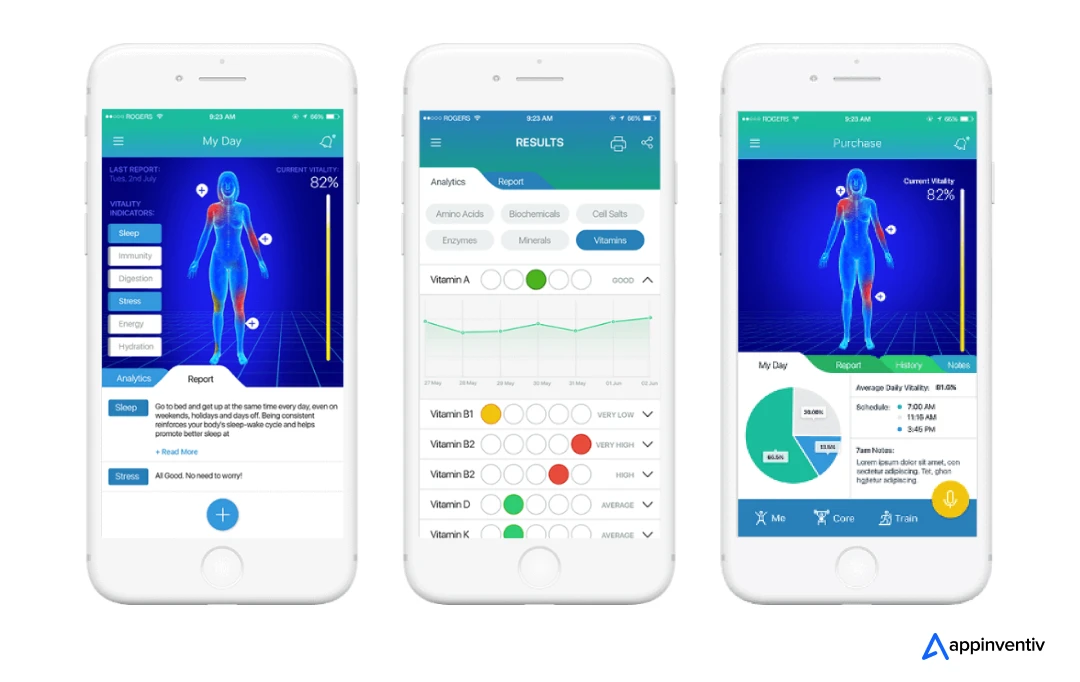
This groundbreaking approach has enabled millions to gain valuable insights into how their voice patterns relate to their health, personality traits, and physical well-being, driving a deeper understanding of overall physical and mental wellness.
With our expertise in data security and scalable architecture, we help you navigate the complexities of mental health app development, ensuring your product stands out with user-centric and impactful features.
Partner with Appinventiv, and together, we will build an intuitive, on-demand mental health app that empowers users, transforms mental health care, and leads the way in this fast-evolving industry.
Q. What are the functions of mental health apps?
A. Mental health apps aim to promote and improve mental well-being by providing accessible tools and resources. Their key functions include:
Q. How to build a mental health app?
A. Here are some of the crucial steps of building a robust mental health app:
Define the purpose and type of mental health app
Q. What are the key features of mental health app?
A. Mental health apps are structured into three key panels: the User Panel, Caregiver/Clinical Professional Panel, and Admin Panel. Each panel serves a distinct role in ensuring a comprehensive and effective mental health experience. Below is an overview of the key features of mental health apps for 2025 and beyond:
User Panel Features
Clinical/Professional Panel Features
Admin/Management Panel Features
Q. Why creating a mental health app is beneficial for users and owners?
A. Mental health apps have numerous benefits for users and app owners. They provide easy access to mental health resources, overcoming barriers like stigma and location. With personalized tools and interactive features like gamified mental health tracker apps, users can better manage their mental health at their own pace and cost-effectively.
The increasing demand for digital mental health services presents strong business opportunities for app owners. Revenue can be generated through subscriptions, in-app purchases, and partnerships, and improving access to care can also make a positive social impact. The scalable nature of these apps also allows for global expansion and continuous growth.
10 Ways Artificial Intelligence is Transforming the Legal Services Industry
Christina Blacklaws, the former president of the Law Society, recently said in an interview, “I’d love to see firms embrace tech faster,” capturing the palpable excitement around artificial intelligence in the legal industry. Today, legal firms are keeping pace with the latest AI trends to automate workflows, streamline research, and enhance client service. The adoption…
How Much Does it Cost to Build a Home Service App Like Urban Company?
The on-demand app industry has revolutionized consumer behavior, making access to essential services easier, faster, and more reliable than ever before. Whether it’s booking a professional cleaner, a plumber, or a beauty expert, apps like Urban Company have set new benchmarks for convenience and efficiency. This shift aligns with changing consumer expectations in a digital-first…
How Voice Technology in Healthcare Enhances Patient Experience and Clinical Efficiency
Imagine a day when hospitals are not flooded with extensive documentation, conversations can save significant time, and physician-patient interaction is raised to new heights. Fortunately, we do not have to imagine this anymore; due to the evolution of voice technology, this is what we witness today. A survey conducted in one of the largest hospital…
B-25, Sector 58,
Noida- 201301,
Delhi – NCR, India
79, Madison Ave
Manhattan, NY 10001,
USA
Appinventiv Australia,
East Brisbane
QLD 4169, Australia
3rd Floor, 86-90
Paul Street EC2A 4NE
London, UK
Tiger Al Yarmook Building,
13th floor B-block
Al Nahda St – Sharjah
Suite 3810, Bankers Hall West,
888 – 3rd Street Sw
Calgary Alberta
Full stack mobile (iOS, Android) and web app
design and development agency
Appinventiv is the Registered Name of Appinventiv Technologies Pvt. Ltd., a mobile app development company situated in Noida, U.P. India at the street address – B- 25, Sector 58, Noida, U.P. 201301.
All the personal information that you submit on the website – (Name, Email, Phone and Project Details) will not be sold, shared or rented to others. Our sales team or the team of mobile app developers only use this information to send updates about our company and projects or contact you if requested or find it necessary. You may opt out of receiving our communication by dropping us an email on – info@appinventiv.com
1600+ transformation engineers delivered
3000+ game-changing products.
We chose Appinventiv to build our financial literacy and money management app from start to finish. From the first call, we were very impressed with Appinventiv’s professionalism, expertise, and commitment to delivering top-notch results.
It has been a pleasure working with Appinventiv. The team is not only extremely versatile and competent but also very professional, courteous, and responsive. We certainly plan to continue working with Appinventiv for an indefinite period.
We took a big leap of faith with Appinventiv who helped us translate our vision into reality with the perfectly comprehensive Edamama eCommerce solution. We are counting to get Edamama to launch on time and within budget, while rolling out the next phase of the platform with Appinventiv.
I just want to take a moment to thank the entire Appinventiv team for your incredible support. We truly appreciate everything you’ve done, and we’re excited to continue working together as we grow here at KODA
After researching numerous companies, we finally found Appinventiv, and it was the best decision we could have made. They successfully addressed the challenges with our existing app and provided solutions that exceeded our expectations.
We approached Appinventiv with a clear vision to build a robust and future-ready platform that could seamlessly integrate with the busy lifestyle of our customers while uplifting their overall experience and giving us a competitive edge.
1600+ transformation engineers delivered
3000+ game-changing products.
Connect with our consultation experts to get:
Insights specific to your business needs
Roadmap to overcome your challenges
Opportunities to scale your business in this niche.


